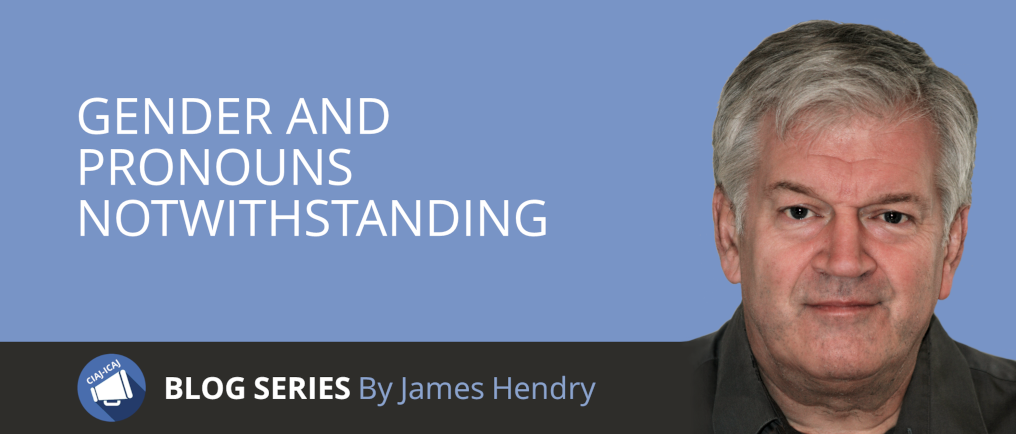Gender and Pronouns Notwithstanding

This blog post is part of a series on “SCC Decisions and more” written by CIAJ’s collaborator James Hendry. Read all his posts here.
Gender and pronouns notwithstanding
I want to pick up the story of the injunction issued by Megaw J of the Saskatchewan Court of Kings Bench against the policy preventing schoolkids under 16 from using their preferred names and pronouns without parental consent. I noted in my earlier blog that the Saskatchewan legislature reacted by passing a “Parents’ Bill of Rights” as an amendment to the Education Act, 1995. Extraordinarily, it invoked the s.33 override provision of the Charter allowing it to operate notwithstanding the breach of ss. 7 and 15 claimed in the injunction case. Next, the claimants went back before Megaw J to add a new claim that the amendment breached the Charter’s prohibition of cruel and unusual treatment in s. 12, a provision not expressly overridden. The government then applied to shut down the case. Megaw J refused to strike out the original action on the basis that the court had jurisdiction to decide whether the new “Parental Bill of Rights” was contrary to ss. 7 and 15 and additionally added the s. 12 claim of cruel and unusual treatment. Saskatchewan appealed.
My main concern in this blog is the use of s 33 to shut down Megaw J’s finding of potential irreparable harm based on expert evidence about the effect of misgendering and outing on trans kids whose could suffer mental and physical health if not supported compassionately by their parents.
The Saskatchewan Legislative Assembly reacted to Megaw J’s go-ahead ruling by holding an “emergency session” to ensure the primacy of the parents’ place in their kids’ education asserting them as rights. The government was sufficiently concerned that they invoked the draconian Charter override (4042-3). Presumably expecting exceptions to compassionate parenting, the amendment provides for the school’s assistance to kids where harm could happen. No sooner had the government moved a second reading of the amendment, the opposition replied with a lengthy review of Megaw J’s findings on the evidence and decried the lack of consultation with parents, psychologists, teachers and schools (4043-68). During the next day of debate, one legislator said that that s. 33 was invoked to “assert legislative authority in the face of judicial overreach” (4107).
The claimants’ position in the Saskatchewan case has been made more difficult by the Court of Appeal for Quebec in a case about the Act respecting the laicity of the State which prohibits public servants from wearing religious attire, discriminating against Muslim women in particular also subject to s.33. Megaw J had relied on the trial level decision in Hak v. AG Quebec to support his holding that the Charter questions could be answered even in the face of s. 33, but had also come to the same conclusion on his own from first principles. Unhelpfully, the Court of Appeal unanimously held that invoking s. 33 prevented a court from ruling on a question that s.33 placed outside of judicial review. The SCC had held in AG Quebec v. Ford that s. 33 created a requirement of form only that “protects” a statutory provision “from the application of” the specified sections of the Charter. The Court of Appeal noted that courts could use their discretion to hear a moot case considering (1) an adversarial context (2) judicial economy and (3) a proper judicial role. The Court of Appeal parsed the adversarial context exception to mootness closure by noting that the AG Quebec did not defend the Charter issues because of the current law on s. 33. Further, it would not address the Charter issues on the off chance the legislature withdrew s.33 because courts do not issue hypothetical or speculative judgements.
I think our democracy would be well served by creating an exception to the mootness rule to require a government respond to a claim that legislation infringes the Charter where it is protected by s.33. By allowing the law to operate for five years so it would extend into the next election after its use, the framers clearly intended that voters should get a crack at legislators who used s. 33. The force of this approach is diminished somewhat by Arrow’s “impossibility theorem” which predicts that specific issues such as a no-s.33 vote cannot be disaggregated from other election issues in our current voting system. However, we have seen demonstrations bring social justice issues to the attention of voters such as the one that caused Ontario to immediately repeal the Keeping Students in Class Act which imposed a collective agreement on education workers subject to s.33. The failure of a court to use its discretion to allow the Charter issue to be heard in the face of s.33 reduces the value of voter dissent to legislators. Perhaps the SCC will be persuaded that it would often help democratic debate by at least allowing the courts to decide the issue of Charter compliance with a law overridden by s.33. Even some commentators who have objected to values-based judging have advocated a democratic representation-reinforcing approach such as John Hart Ely (Democracy and Distrust, 101-4).
Lowering the bar in the mootness doctrine allowing a Charter issue covered by s.33 offers something to legislators, claimants and advocates. It could also help the democratic resolution of trans kids issue in Saskatchewan.
***Not for use as legal advice
“The political issue about the school policy prohibiting under-16 trans kids using their names and pronouns in school without parental consent continues to seesaw between the courts and legislature in Saskatchewan. The judge who originally enjoined the government from implementing this policy later refused the government’s move to end the legal proceedings after the legislature made it law subject to the Charter’s legislative override. Saskatchewan has appealed.”

